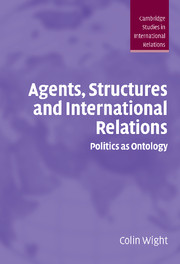Book contents
- Frontmatter
- Contents
- List of figures
- Acknowledgements
- Introduction
- 1 IR: a science without positivism?
- 2 The agent–structure problem: from social theory to IR theory
- 3 The agent–structure problem in IR theory: preliminary issues
- 4 Structure
- 5 Agency
- 6 The agent–structure problem: epistemology
- 7 The agent–structure problem: methodology
- 8 Conclusion
- References
- Index
- CAMBRIDGE STUDIES IN INTERNATIONAL RELATIONS
5 - Agency
Published online by Cambridge University Press: 22 September 2009
- Frontmatter
- Contents
- List of figures
- Acknowledgements
- Introduction
- 1 IR: a science without positivism?
- 2 The agent–structure problem: from social theory to IR theory
- 3 The agent–structure problem in IR theory: preliminary issues
- 4 Structure
- 5 Agency
- 6 The agent–structure problem: epistemology
- 7 The agent–structure problem: methodology
- 8 Conclusion
- References
- Index
- CAMBRIDGE STUDIES IN INTERNATIONAL RELATIONS
Summary
Ludwig Wittgenstein once remarked that the ‘first step is the one that altogether escapes notice’ and that this unacknowledged first step ‘commits us to a particular way of looking at things’. The first step for IR theory, and one upon which its identity might be said to depend, is the construction of the ‘state-as-agent’. As Tony Skillen notes, ‘even to talk of the “international-level” could mislead one into seeing nation states as the units of global political currents’. Indeed, any denial of the ‘state-as-agent’ thesis might seem to presage the end of IR as an academic discipline. There are good reasons, then – reasons related to the division of academic labour – for the widespread acceptance of the ‘state-as-agent’ thesis within the IR academic community. For without the notion of the ‘state-as-agent’, IR appears to be little other than a macro-sociological exercise in political theory or history. Devoid of the notion of the ‘state-as-agent’ the answer to Martin Wight's search for international theory is clear: if the state is not an agent, then international theory just is political theory – although perhaps with a wider spatial remit. Without a notion of the ‘state-as-agent’ the distinction between political theory and international theory collapses.
That the identity of the discipline depends upon this assumption goes part of the way towards explaining why IR has not grappled, in a systematic manner, with the concept of agency.
- Type
- Chapter
- Information
- Agents, Structures and International RelationsPolitics as Ontology, pp. 177 - 225Publisher: Cambridge University PressPrint publication year: 2006



